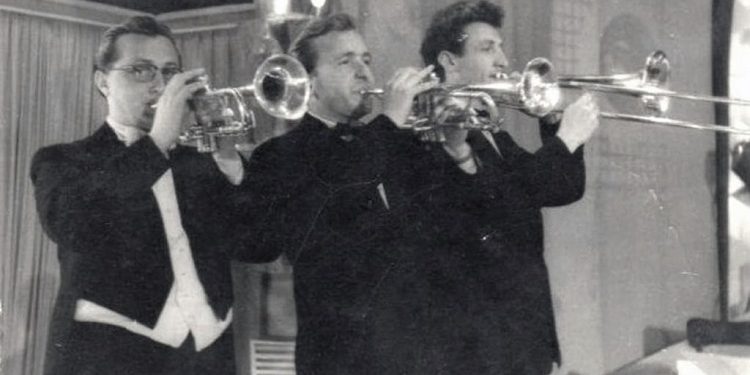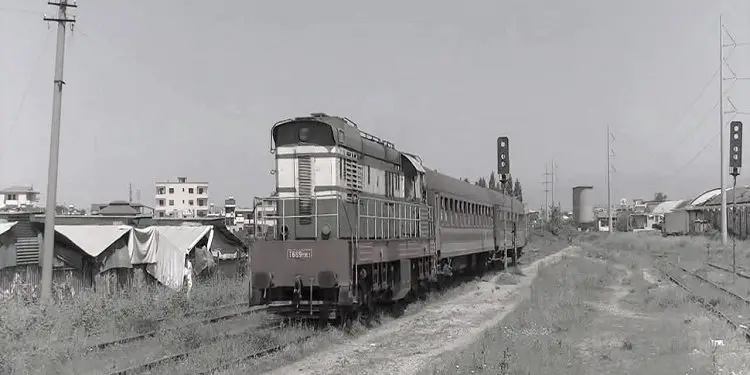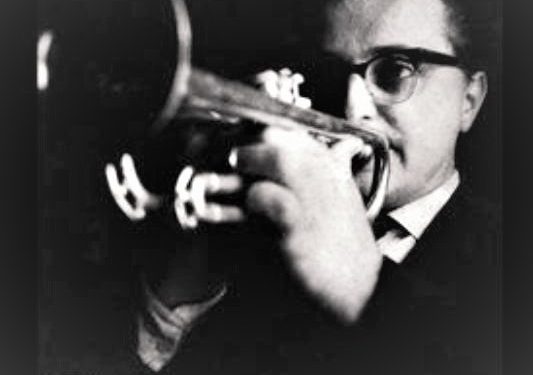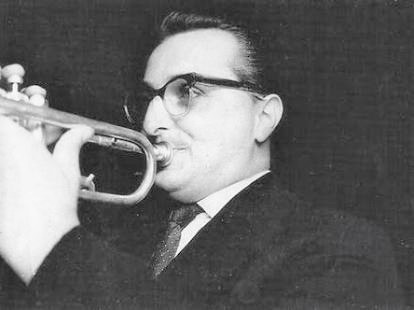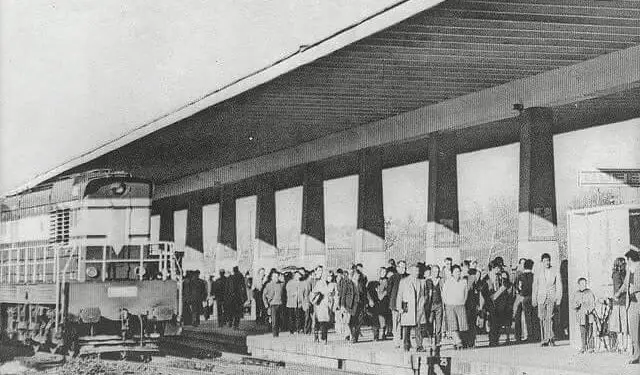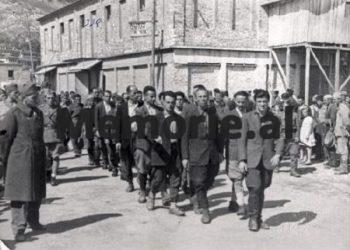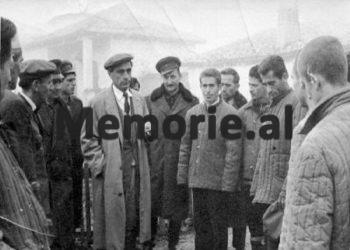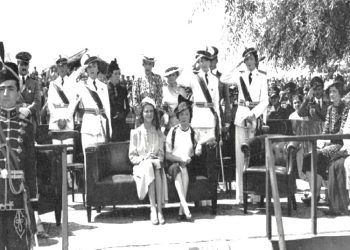By Ferdinand Dervish
The first part
Memorie.al / On the frosty morning of December 12, 1984, two train drivers of the Shkodra line, L. Dukeli and S. Çekerku, happened to meet each other as though they were crazy. Their faces were gone, while they clutched some train tickets in their hands, which they had taken in trust for the passengers departing from Tirana. The suspicion of the past days was confirmed again. After they had agreed, the two women, who would then be decorated for this discovery, which in turn would cause the shooting of two human beings, one of whom, the well-known musician Gasper Çurçia, had rushed to meet the dispatcher, or the manager of the train, Xh. Beshnuni.
In the cabin of this one, the two women insisted that some of the tickets that the passengers had in their carriages were quite different from the usual ones. They had neither the same color nor the same paper. The dispatcher was quickly convinced that something big was happening, that the tickets must certainly be fake and that this story must necessarily end in the police. With his mind working, he orders the two women to collect all the passengers’ tickets near the Shkodra station, finding various excuses and communicates the same order to the other billers. A little while later, while getting off at the Shkodra station, the passengers observed numerous police forces blocking the passengers from getting off from two of the wagons.
On the trail of the ticket seller
At the Shkodra station, the police had it quite simple. All the passengers holding the suspicious tickets had given the same address of their purchase. They had bought them that morning, at the second counter in the queue, in the bee shop of the Tirana Train Station. Someone even mentioned the name of the woman who worked there. It was called Beauty.
Within the same day, December 12, without finishing the official working hours, the Tirana police colleagues had put under surveillance the second ticket counter of the Tirana station. The woman’s name was Bukurie Gjeçi, she was in her forties, married, with two minor children and without any advertised problems with the progress at work. The order was clear. She had to be stopped and searched, without finishing the official schedule. The policemen who approached her counter would later testify that the other woman almost fainted when they told her they had to do a check.
According to an investigator of the case, the amount benefited from the fake tickets sold, mainly during 1984, by Bukurie Gjeçi, together with the amount of those fake tickets that had not yet been sold, was somewhere around 4.7 million old ALL. An amount that at that time could be converted to the common value of several residential houses.
So, the police found Gjeci’s personal bag, full of counterfeit tickets. She had been the only seller of fake train tickets, the same tickets, for which they had suspected in those cold days of December 1984, the two invoices of the Tirana-Shkodër line.
Without going to the questioning of the saleswoman, the policemen, taking a look at the seized bag, had observed with their naked eyes, two types of fake tickets. Some were almost black and white, unlike the originals, which had a hint of green. While the rest, or half of them, were just like the originals. But the terrorized woman did not let them suffer for long. She was willing to cooperate.
The arrest of musician Gasper Çurçia
There would be another arrest that night. Around 20:00 in the evening, a group of policemen would get out of the car near a building on “Ferit Xhajko” street in Tirana, where the musician Gasper Çurçia lived. It is not known how the events unfolded with the questioning of the ticket seller, but of course that police car was found there based on her data.
The police had initially asked to search the musician’s personal room, asking him with threats where he kept the money. The musician had shown them a drawer, he had even given them the key, but the police were dissatisfied with the amount of money found. Further, they had closed the room, to avoid the presence of other family members and had convinced Church that, they already knew so much, that it would be good for him to show the money, as well as the train ticket stamping machine.
Afterwards, the word would spread among the people, or the true rumor, that Gasper Çurçia had hidden the money inside the piano and that this money was in a surprising amount. In fact, the police found only the stamp inside the piano, while the money was in a locked drawer. Around midnight, the policemen left “with their hands full”, taking with them the owner of the house, Gasper Çurçia. According to a calculation, they had found in his house, an amount of about 15 thousand ALL, not counting the value of fabricated tickets, which were still unsold.
Arrests of two groups
That same day, after only the dates had been changed, but not the black color of the night, Gasper Çurçin and Bukurie Gjeçin would be followed in the footsteps of the same fate by several other prisoners, all of whom, implicated in the forgery of train tickets. Soon the investigators realized that two different groups of counterfeiters were being set up, giving the tickets to the same seller, Bukurie Gjeçi.
Yes, according to the investigation, the first group, which had cooperated with the newly handcuffed saleswoman, included, apart from Çurçia, also a third collaborator, N. Hyskajn, an employee of NTUS (Social Food Trading Enterprise) of Tirana. This too had helped in the realization of the forgery of the train tickets and thus had received a part of the profit.
On the other hand, the second group of those arrested, which seems to have acted in complete conspiracy, had nothing to do with Gasper Çurçi, even none of them knew that Çurçi also “supplied” tickets to the same seller. The head of the second group was a tall and handsome guy, working at the Tirana Post Office, named Shkëlzen Doçi. He seems to have been the next big prey for the police. In his house, exactly under the bed where his brother slept, a metal suitcase with money, all obtained from the sale of fake train tickets, was found.
Since no one could be brave in front of the investigators of that time, soon six more associates ended up in handcuffs, connected in one way or another with Shkëlzen Doçi and the forgery of train tickets. Finally, in March 1985, ten arrested for forging train tickets go before the court, mostly under the same charge.
The two ways of forgery
The surprise of the investigators had become even greater after they had learned that the two groups, which had as a common point their seller, Bukurie Gjeçi, had different methods of illegally producing train tickets. The documents in the court file do not say exactly which of the groups started the forgery first. It is only written in one case that Bukurie Gjeçi had previously communicated with an acquaintance of Shkëlzen Doçi.
So, for both parties, the same period of making money by means of fake tickets is mentioned, which corresponds to the beginning and end of 1984. On the other hand, the documents clearly clarify the two ways in which the forgeries were carried out.
The ex-musician Gasper Çurçia was able to create in the premises of his own house, an artisan printing device that worked with films and made fake train tickets, of a high quality.
Their accuracy was clearly seen in the achieved color of the ticket, which was almost indistinguishable from the originals, but lame in the other elements, especially in the letters and numbers. While the other group, which falsified tickets with the help of a photocopier found in the office of the engineer of the Central Post Office, Shkëlzen Doçi, was less successful, in the quality of the color of the tickets, but more accurately in the projection of letters and numbers. It is even claimed that, even though the tickets were photocopied in black and white, they were sold successfully, without causing suspicion among train passengers.
In lead, for 5 million ALL…!
In recent times, it may seem unbelievable, but once upon a time, when the so-called “dictatorship of the proletariat” or the “class war” kept alive the rotten edifice of communist Albania, one could be shot, even for theft, where no weapons were used; no one was injured or threatened. Thus, just for the theft of train ticket values, through forgery, in 1984, with a damage amount of about 4.5 million ALL (old) of that time, the courts sent three of the ten accused to death.
And this was done, not because the damage caused could shock the Bank of the Albanian State, but to show all the inhabitants of the country surrounded by barbed wire, that the communist state is very strong and that all those who will try to lay hands on the “common wealth”, will have the same fate. So, a policy that, more than the implementation of the laws, was intended to prolong the system, through the fear created by making an example of a part of its citizens.
However, the Presidium of the People’s Assembly, which had the attribute of pardoning life, puts its hand on the heart, only for one sentenced to death, of the file of train tickets, while nothing changes, for the fate of Gasper Çurçi and Shkëlzen Doçi. Both of them would be shot at night, 24 hours before the former Albanian dictator, Enver Hoxha, officially died.
Even the other detainees, of the same file, were not spared extreme punishments, which went up to 17 years of imprisonment. As if to complete the whole framework, on the other hand, on the part of those who had agreed with the rules, regardless of the quality of life they dictated, for the same issue, there were also decorated ones. It was precisely the two invoices of the Shkodra line and the train dispatcher who received the credit for discovering this group of criminals.
By making these also, quite unwittingly, the protagonists of a story that once shocked an entire nation. For this event of unusual proportions, which had a great impact on public opinion at the time it happened, we have prepared a complete cycle of writings, bringing facts and documents not published before. Testimonies of the protagonists, the investigators of the case, as well as the people who directly participated in the shooting of Gasper Çurçi and Shkëlzen Doçi have also been provided.
The arrested of the “Group of forgers of train tickets”
- Bukurie Gjeçi, born on 20.11.1946, born in Shijak and living in Tirana, Neighborhood No. 1, “Dhimitër Kamarda” Street, Palace No. 7, entrance 9, with Albanian citizenship and nationality, with a working social background, with a former job as a ticket seller at the Train Station in Tirana, married with two minor children, undecorated, without immunity, with secondary economic education, not convicted, without a party, arrested on 12.12.1984.
- Gasper Çurçia, born on 13.11.1934, born in Shkodër and resident in Tirana, Neighborhood No. 3, “Ferit Xhajko” Street, Building No. 63/1, with Albanian citizenship and nationality, social origin middle-class merchant, social status retired, former employee in the company of teaching aids in Tirana, married with three children, with completed military service, without immunity, not decorated, with secondary education, not convicted, without a party, arrested on 12.12.1984.
- N. Hyskaj, born on 25.01.1942, born in Vlora and resident in Tirana, Neighborhood No. 4, Rruga “H.Dalliu”, building 16/1, with Albanian citizenship and nationality, of social origin middle merchant, with social painter in NTUS, Tirana, married with one child, with, not convicted, without immunity, without Party, with incomplete secondary education, arrested on 15.12.1984.
- Shkëlzen Doçi, born 30.11.1949, born and resident in Tirana, Neighborhood No. 4, “Kongresi i Përmetit” Street, Palace 144, ap, 44, social origin civil servant of the people’s power, social status civil servant in the Transit Services Enterprise, with Albanian citizenship and nationality, single, undecorated, without immunity, with higher education, without Party, not convicted, arrested on 13.12.1984.
- B. Erebara, born on 25.06.1951, born and resident in Tirana, Neighborhood No. 9, Rruga “Skënderbej”, building 33/2, with Albanian citizenship and nationality, social origin painter in Tirana Electrotechnical Enterprise, married with two children, undecorated, without immunity, with higher education, Institute of Arts, not convicted, without Party, arrested on 15.12.1984.
- K. Shefqeti, born on 21.10.1948, born and resident in Tirana, Neighborhood No. 7, Ruga “Pandi Dardha”, building 44, with Albanian citizenship and nationality, of origin and social status, worker at the Autotractor Combine, single, with completed military service, not decorated, without immunity, with secondary education, not convicted, without Party, arrested on 15.12.1984.
- S. Sadkaj, born on 15.11.1950, born in Durrës and resident in Tirana, Lagjja 10, Rruga “Aleksandër Moisiu”, Palace 36/3, Apartment 39, with Albanian citizenship and nationality, with origin and social status worker in the Factory of Kupuce, married, second marriage with four children, with secondary education and Military High School, not convicted, no immunity, no Party, arrested on 13.12.1984.
- D. Vasho, born on 25.10.1948, born in Durrës and resident in Tirana, Neighborhood No. 8, Rruga “Myslym Shyri”, building 10/1, apartment 20, with Albanian citizenship and nationality of origin and social status, worker in the greenhouse sector of the Greening Enterprise, married with two minor children, with completed military service, not decorated, without immunity, with secondary education, not convicted, without a Party, arrested on 13.12.1984.
- Koxhaxhiku, born 10.03.1949, born in Durrës and resident in Tirana. Lagjja 9, Rruga “Muhamet Gjollesha, building 39/1, Apartment 19, with Albanian citizenship and nationality, by origin and social status clerk, electrical engineer in a shoe factory, married with two children, decorated with the Order of Class Work the Third from the Presidium of the People’s Assembly, without immunity, with a higher education, not convicted, without a Party, arrested on 13.12.1984.
- Fejzo, born on 15.06.1953, born in Allagjatë and resident in Tirana, Neighborhood 10, Rruga “Niko Avrami”, with Albanian citizenship and nationality, by origin and social status worker in the Bridge Construction Company, married with two minor child, with completed military service, without immunity, not decorated, convicted for fraud with 6 months of imprisonment in 1977, with 8th grade education, no party, arrested on 17.12.1984./Memorie.al
The next issue follows




